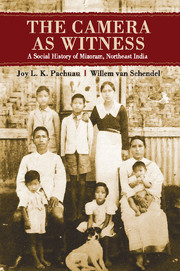Book contents
- Frontmatter
- Contents
- List of Figures
- List of Maps
- Acknowledgements
- I Becoming Mizo
- 1 Introduction
- 2 Coming into View: The First Portraits
- 3 Adjusting Mizo Culture
- 4 Domesticating a New Religion
- 5 Getting Educated
- 6 Controlling the Hills
- 7 The Trouble of Travel
- 8 First Stirrings of the Market Economy
- 9 Mizos in the World Wars
- 10 Mizo Visual Sensibilities
- II Mizoram in the New India
- III Visions of Independence
- IV Mizo Modernities
- Copyrights and Sources
- Glossary
- Bibliography
- Index
5 - Getting Educated
from I - Becoming Mizo
Published online by Cambridge University Press: 05 May 2015
- Frontmatter
- Contents
- List of Figures
- List of Maps
- Acknowledgements
- I Becoming Mizo
- 1 Introduction
- 2 Coming into View: The First Portraits
- 3 Adjusting Mizo Culture
- 4 Domesticating a New Religion
- 5 Getting Educated
- 6 Controlling the Hills
- 7 The Trouble of Travel
- 8 First Stirrings of the Market Economy
- 9 Mizos in the World Wars
- 10 Mizo Visual Sensibilities
- II Mizoram in the New India
- III Visions of Independence
- IV Mizo Modernities
- Copyrights and Sources
- Glossary
- Bibliography
- Index
Summary
Today the people of Mizoram pride themselves on inhabiting one of the most literate regions of India. In fact, the districts of Aizawl and Serchhip (with a rate of 98 per cent) are the most literate in the entire country. This is astonishing in view of the situation at the turn of the twentieth century. At that time the hill people were completely illiterate, even though literacy had been well known in the surrounding plains of Burma, Assam and Bengal for many centuries. The hill languages had never been written down and children were not taught in formal settings. The closest equivalent to schools were the age-set ‘bachelor dormitories’ where adolescent boys spent time together and learned about hunting, warfare and wrestling (Figure 4.15). The absence of writing amongst the hill people allowed inhabitants of the plains (and the British) to look down upon them as uncivilized, primitive and savage. Therefore, it was a spectacular change for the hill people to become more literate than their neighbours in the plains.
Colonial rule introduced the idea of the written word. At first the small British administrative and military establishment relied on indirect rule through village chiefs and on ‘native interpreters’ (often Gurkhas from Nepal who had arrived with the military expeditions and who still form a distinct community in Mizoram [Figure 5.1]) but soon they needed local clerks as well. The demand for local support staff was small, however, and does not explain the spread of literacy. Nor does the mere fact that Mizos chose to become Christians. The key is in the specific type of Christianity that was on offer. Both Presbyterians and Baptists represented Protestantism, a branch of Christianity that sets great store by textual knowledge among laymen. In their view, Christians should get their personal inspiration and guidance from Bible study rather than from church ritual and liturgy. In this emphasis, they differed from, say, Roman Catholics whose priesthood interpreted the Bible for laymen and for whom lay Bible study was not a priority.
- Type
- Chapter
- Information
- The Camera as WitnessA Social History of Mizoram, Northeast India, pp. 87 - 108Publisher: Cambridge University PressPrint publication year: 2015

